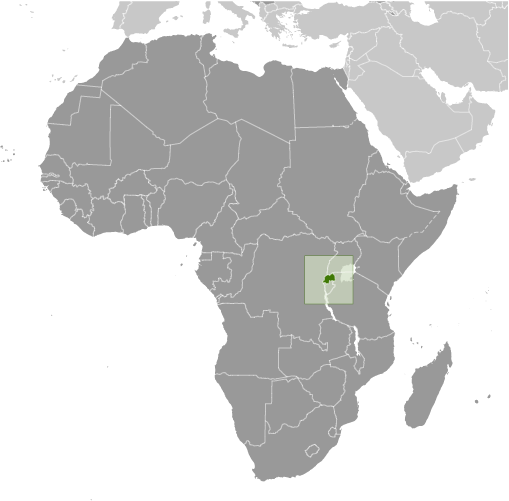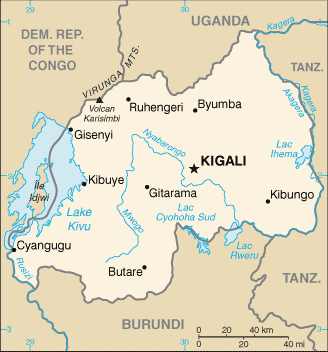In 1959, three years before independence from Belgium, the majority ethnic group, the Hutus, overthrew the ruling Tutsi king. Over the next several years, thousands of Tutsis were killed, and some 150,000 driven into exile in neighboring countries. The children of these exiles later formed a rebel group, the Rwandan Patriotic Front (RPF), and began a civil war in 1990. The war, along with several political and economic upheavals, exacerbated ethnic tensions, culminating in April 1994 in the genocide of roughly 800,000 Tutsis and moderate Hutus. The Tutsi rebels defeated the Hutu regime and ended the killing in July 1994, but approximately 2 million Hutu refugees - many fearing Tutsi retribution - fled to neighboring Burundi, Tanzania, Uganda, and Zaire. Since then, most of the refugees have returned to Rwanda, but several thousand remained in the neighboring Democratic Republic of the Congo (DRC; the former Zaire) and formed an extremist insurgency bent on retaking Rwanda, much as the RPF tried in 1990. Rwanda held its first local elections in 1999 and its first post-genocide presidential and legislative elections in 2003. Rwanda in 2009 staged a joint military operation with the Congolese Army in DRC to rout out the Hutu extremist insurgency there and Kigali and Kinshasa restored diplomatic relations. Rwanda also joined the Commonwealth in late 2009.
Population
11,055,976
Country comparison to the world: 74
note:estimates for this country explicitly take into account the effects of excess mortality due to AIDS; this can result in lower life expectancy, higher infant mortality, higher death rates, lower population growth rates, and changes in the distribution of population by age and sex than would otherwise be expected (July 2010 est.)
Nationality
Noun:Rwandan(s)
Adjective:Rwandan
Ethnic groups
Hutu (Bantu) 84%, Tutsi (Hamitic) 15%, Twa (Pygmy) 1%
Religions
Roman Catholic 56.5%, Protestant 26%, Adventist 11.1%, Muslim 4.6%, indigenous beliefs 0.1%, none 1.7% (2001)
Languages
Kinyarwanda (official) universal Bantu vernacular, French (official), English (official), Kiswahili (Swahili) used in commercial centers
Country Name
Conventional long form:Republic of Rwanda
Conventional short form:Rwanda
Local long form:Republika y'u Rwanda
Local short form:Rwanda
Former:Ruanda, German East Africa
Government Type
republic; presidential, multiparty system
Capital
Name:Kigali
Geographic coordinates:1 57 S, 30 04 E
Time difference:UTC+2 (7 hours ahead of Washington, DC during Standard Time)
Administrative divisions
4 provinces (in French - provinces, singular - province; in Kinyarwanda - intara for singular and plural) and 1 city* (in French - ville; in Kinyarwanda - umujyi); Est (Eastern), Kigali*, Nord (Northern), Ouest (Western), Sud (Southern)
Independence
1 July 1962 (from Belgium-administered UN trusteeship)
National Holiday
Independence Day, 1 July (1962)
Constitution
new constitution passed by referendum 26 May 2003
Legal system
based on German and Belgian civil law systems and customary law; judicial review of legislative acts in the Supreme Court; has not accepted compulsory ICJ jurisdiction
Suffrage
18 years of age; universal
Executive branch
Chief of state:President Paul KAGAME (since 22 April 2000)
Head of government:Prime Minister Bernard MAKUZA (since 8 March 2000)
Cabinet:Council of Ministers appointed by the president
(For more information visit the World Leaders website)
Elections:President elected by popular vote for a seven-year term (eligible for a second term); elections last held on 25 August 2003 (next to be held on 9 August 2010)
Election results:Paul KAGAME elected president in first direct popular vote; Paul KAGAME 95.1%, Faustin TWAGIRAMUNGU 3.6%, Jean-Nepomuscene NAYINZIRA 1.3%
Legislative branch
bicameral Parliament consists of Senate (26 seats; 12 members elected by local councils, 8 appointed by the president, 4 appointed by the Political Organizations Forum, 2 represent institutions of higher learning; members to serve eight-year terms) and Chamber of Deputies (80 seats; 53 members elected by popular vote, 24 women elected by local bodies, 3 selected by youth and disability organizations; members to serve five-year terms)
Elections:Senate - members appointed as part of the transitional government (next to be held in 2011); Chamber of Deputies - last held on 15 September 2008 (next to be held in September 2013)
Election results:percent of vote by party - RPF 78.8%, PSD 13.1%, PL 7.5%; seats by party - RPF 42, PSD 7, PL 4, additional 27 members indirectly elected
Judicial branch
Supreme Court; High Courts of the Republic; Provincial Courts; District Courts; mediation committees
Political Parties and Leaders
Centrist Democratic Party or PDC [Alfred MUKEZAMFURA]; Democratic Popular Union of Rwanda or UDPR [Adrien RANGIRA]; Democratic Republican Movement or MDR [Celestin KABANDA] (officially banned); Islamic Democratic Party or PDI [Andre BUMAYA]; Liberal Party or PL [Protais MITALI]; Party for Democratic Renewal (officially banned); Rwandan Patriotic Front or RPF [Paul KAGAME]; Social Democratic Party or PSD [Vincent BIRUTA]; Solidarity and Prosperity Party or PSP [Pheobe KANYANGE]
Political pressure groups and leaders
IBUKA (association of genocide survivors)
International organization participation
ACP, AfDB, AU, C, CEPGL, COMESA, EAC, EADB, FAO, G-77, IBRD, ICAO, ICRM, IDA, IFAD, IFC, IFRCS, ILO, IMF, Interpol, IOC, IOM, IPU, ISO (correspondent), ITSO, ITU, ITUC, MIGA, MINURCAT, NAM, OIF, OPCW, UN, UNAMID, UNCTAD, UNESCO, UNIDO, UNMIS, UNWTO, UPU, WCO, WFTU, WHO, WIPO, WMO, WTO
Diplomatic representation in the US
Chief of mission:Ambassador James KIMONYO
Chancery:1714 New Hampshire Avenue NW, Washington, DC 20009
Telephone: [1] (202) 232-2882
FAX:[1] (202) 232-4544
Diplomatic representation from the US
Chief of mission:Ambassador W. Stuart SYMINGTON
Embassy:2657 Avenue de la Gendarmerie, Kigali
Mailing address:B. P. 28, Kigali
Telephone:[250] 596-400
FAX:[250] 596-591
Flag description
three horizontal bands of sky blue (top, double width), yellow, and green, with a golden sun with 24 rays near the fly end of the blue band; blue represents happiness and peace, yellow economic development and mineral wealth, green hope of prosperity and natural resources; the sun symbolizes unity, as well as enlightenment and transparency from ignorance










